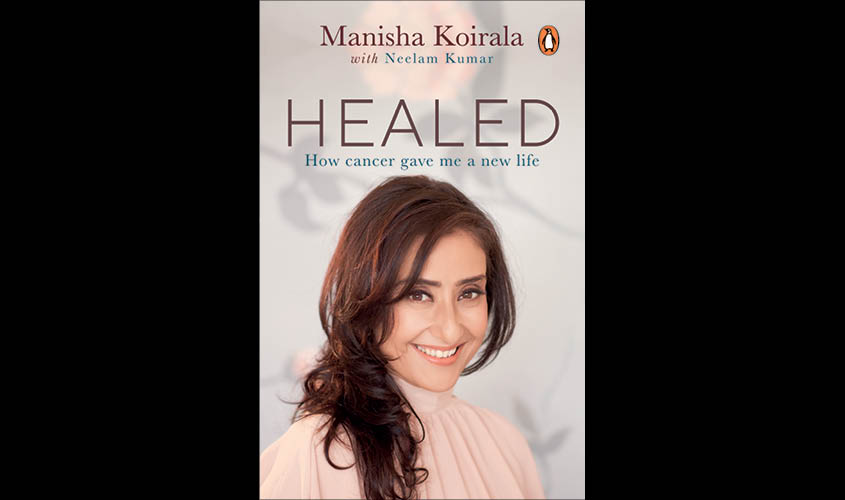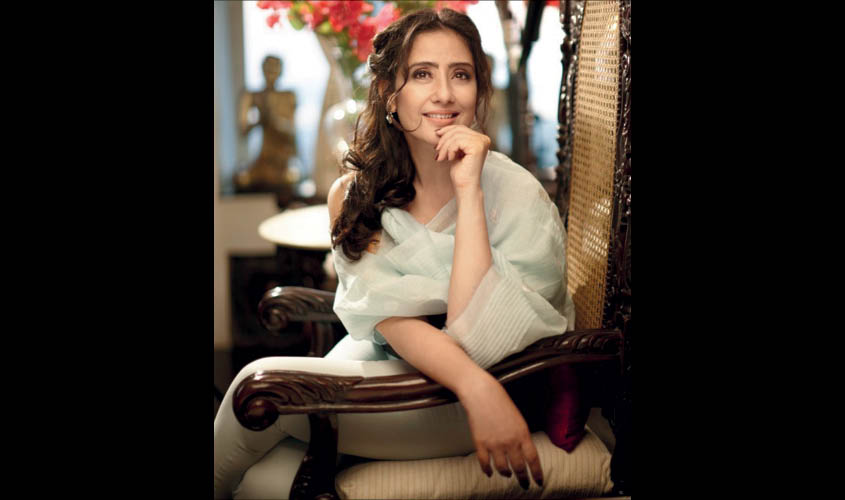Actress Manisha Koirala was diagnosed with ovarian cancer in 2012. The next 12 months were nothing short of a battle for her—a battle fought in diagnostic labs and hospital wards, until she finally became cancer-free in 2013. In her recent memoir, Healed, co-written with Neelam Kumar, she recounts her harrowing yet uplifting journey from sickness to health. Presented here is an exclusive excerpt.
Hope is being able to see that there is light despite all of the darkness.
—Desmond Tutu
4 December 2012
After a nail-biting wait of three days we finally got to meet Dr Dennis Chi, head, section of ovarian cancer surgery, Memorial Sloan Kettering Cancer Center (MSKCC)—an impressive white-and-sky-blue building with the American flag fluttering proudly atop it. Founded in 1884 as the New York Cancer Hospital, the MSKCC is the largest and oldest private cancer centre in the world with inspiring success stories.
We had heard that Dr Chi was an extremely busy man, that his calendar was always full. Luckily, we got an appointment through the intervention of my mom’s school friend Meena Aunty, whom she knew from her Benares days. Her husband, Dr Jhanawar, was working then in the administration department of Sloan Kettering. On my mom’s request he had been kind enough to help us get an earlier appointment. Had it not been for Dr Jhanawar, we would never have been able to meet the extremely busy Dr Chi so soon.
Dr Chi’s credentials and “medical lore” impressed all of us. He had spent over twenty years of his surgical career caring for women with cancerous and non-cancerous gynaecological diseases. He led the field in cutting-edge research, set high standards for state-of-the-art care and had performed many ovarian cancer surgeries successfully.
On googling Dr Chi, I found this on the MSKCC website:

“My mother was an ob-gyn, so I entered my residency thinking I would take over her practice. However, during my first year of training, I was exposed to gynaecologic oncology patients and the procedures used to treat cancers. I saw how quality of care and surgery were so essential to good outcomes for these patients. This inspired me to go into the sub specialty of gynaecologic oncology. I wanted to develop an expertise in advanced ovarian cancer surgery because I saw that this was the area where training, skill, dedication, and perseverance made the most difference.”
I was filled with optimism. So there we were—my closest people and I, buoyed by the confidence-boosting stories about Dr Chi. I sat on the farthest chair in the waiting room, praying that he would give me hope. God knew I badly needed it.
I took quick, light steps into his cabin, positive that he would finally “fix” my problem. A slice of New York sunlight fell into his cabin from the window to the right.
I have always believed that I have a strong sense of intuition about people. My first feeling on meeting Dr Chi was a sense of relief. I felt splashed with sunshine. Dr Chi is a Korean with Mongolian features, and his eyes speak of confidence.
I focused hard on reading his face. I wanted the truth. I tried reading his eyes. Nothing. I tried reading his expression. Nothing.
His expression didn’t give anything away as he looked carefully through my reports. He thumbed each page slowly. I could not take it any more and asked him, “Dr Chi, have you done this kind
“Yes,” he replied. He didn’t look up.
“How long did that patient live?”
“She is alive and doing fine.”
I heaved a sigh of relief.
I felt happy that finally a doctor had agreed with what I had heard was the best protocol—surgery first and six rounds of chemotherapy later. Both Dr Suresh Advani at Jaslok Hospital, Mumbai, and Dr Thomas A. Kaputo at Cornell Hospital, New York, had felt that it should be the other way round—three rounds of chemo first, followed by surgery and then three more rounds of chemo.
I was hoping some doctor would do it the standard way. And here was Dr Chi telling me that this was exactly the protocol he would follow.
Though relieved, I continued to ask more questions, meekly: “Doctor, will you cut my stomach horizontally or vertically?”
Dr Chi looked up and smiled, “I know my job. Please don’t worry.” He must have met many crazy patients in his career. I was sure he would remember me as one of them.
We Koiralas are very family-centric. We are there for each other in every crisis and this was one of unexpected magnitude. So here we were—my parents, my brother, my close relatives and friends. Looking back, I smile when I think of what onlookers must have thought. An entourage of 10–12 very anxious people moving together in groups, all with similar serious expressions.

But after the meeting, there appeared a hint of a smile on all our faces. Not complete smiles, because we did not dare do that, lest the evil eye cast its glance on us, stalling our dreams. But this time, all of us had a spring in our feet. We left his office quietly, not betraying our real emotions. Once inside my hotel room, we all melted.
Beams of joy flew across the room, bounced off our faces and wrapped us all in a big group-hug of warmth.
This was perhaps the first time we had smiled as a family. Hanging on to that branch of hope, I felt like a little child swinging joyfully on a mango tree. So, it would all turn out fine, after all. Dr Chi had been the first doctor to give me hope. I wanted to hug him with gratitude.
If that patient could live, why couldn’t I, I asked myself nonchalantly. Rumi’s beautiful words floated into my mind at that very moment, “Darkness is your candle. Your boundaries are your quest.”
Dr Chi had informed us that my surgery would be on 10 December. I wanted to use this time to research about my condition, its prognosis and the alternative treatments available. I was determined to arm myself with information so that I could feel empowered and not helpless. I would also use this time to catch up with Shail Mama who, for me, represented New York.
I sent emails to a few close friends and received warm, loving messages back. I shut my iPad. It felt good to be cared for.
How do you spell hope, I asked my heart? Pat came the reply, “You don’t spell it. You feel it.” That’s settled then. I would create my own sunshine . . .
Extracted with permission from ‘Healed’, by Manisha Koirala (with Neelam Kumar) is published by Penguin Random House

